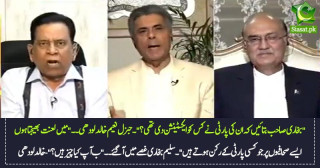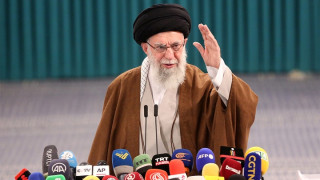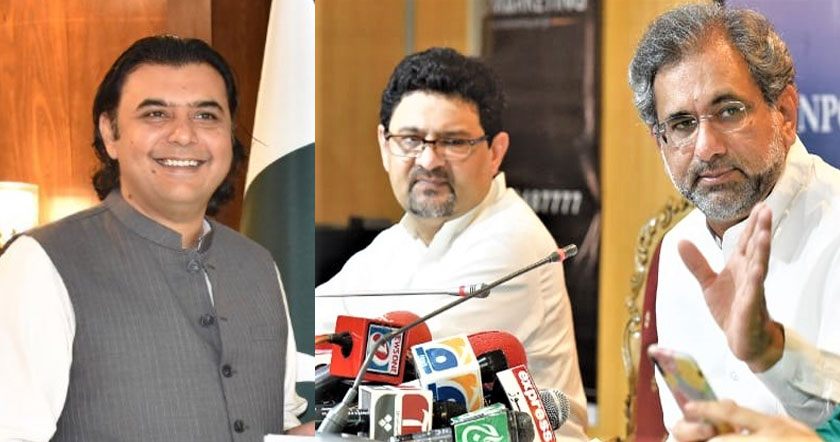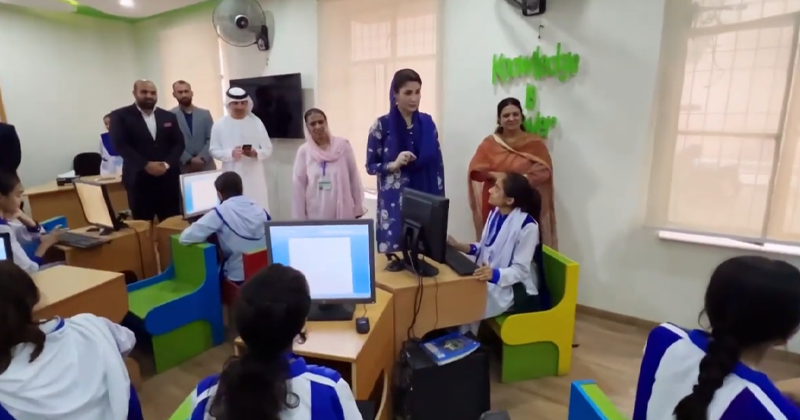Intense US monitoring of Pakistan’s nuclear and missile programmes
By Sultana Saifi | From the Newspaper
 In an April 2008 secret cable, then US Ambassador to Pakistan Anne Patterson stressed to the Strategic Plans Division chief Khalid Kidwai that talk of the “possible release of AQ Khan has caused alarm and concern” among US officials. The ambassador further emphasised the “USG was firmly opposed to lifting the current restrictions on Khan’s activities”. - Photo by Reuters (Thumbnail illustration by Hasaan Haider/Dawn.com)
In an April 2008 secret cable, then US Ambassador to Pakistan Anne Patterson stressed to the Strategic Plans Division chief Khalid Kidwai that talk of the “possible release of AQ Khan has caused alarm and concern” among US officials. The ambassador further emphasised the “USG was firmly opposed to lifting the current restrictions on Khan’s activities”. - Photo by Reuters (Thumbnail illustration by Hasaan Haider/Dawn.com)
KARACHI: Despite Pakistan’s repeated assurances that its history as a nuclear scofflaw was firmly behind it, the US has continued to intensely monitor Pakistan’s nuclear and missile programmes, a survey of US diplomatic cables obtained by Dawn indicates.
Dozens of cables — some confidential, others secret — from US embassies around the world are seen inquiring into purchases by Pakistan’s nuclear and missile complexes on the international market.
For example, at the start of 2008, the US Deputy Chief of Mission Nancy McEldowney at the US embassy in Ankara details her discussions with Turkish authorities about the US desire to see action taken against a suspicious shipment to Pakistan.
US officials, according to the cable, “urged the GOT (Government of Turkey) to contact the governments of Japan and Panama to request the shipment be diverted to another port and returned to the shipper”.
While Turkish authorities “stressed that more lead time was necessary to allow the GOT to take action in such cases”, Ms McEldowney “underscored that, given the proliferation concerns related to this shipment and the fact that Pakistan’s nuclear program is not under full-scope IAEA safeguards, the GOT should take all necessary action to prevent the shipment from arriving in Pakistan”.
The intricate pursuit of suspect Pakistani shipments often involved discussions with Chinese authorities. For example, a secret cable from December 2009 notes that when local authorities were notified of “Beijing-based Nav Technology’s efforts to supply controlled gyroscopes to a firm in Pakistan”, US officials received a satisfactory response “that as with all proliferation cases China would ‘actively cooperate’ on this case”.
In Taiwan, too, Pakistan’s missile programme and related international trade came in for intense American scrutiny. In a secret cable sent out from Taipei in the autumn of 2005, the then director of the American Institute of Taiwan, Douglas H Paal, sent a detailed reported on Pakistan’s trade with a local manufacturer, Xtra Industrial Corporation.
Mr Paal writes about how “Pakistani manufacturer ‘Mechanical Engineering Workshop (MEW)’ possibly purchased 14 sets of ‘hydraulic cylinders’ from Xtra Industrial Corporation in March 2005, from Taiwan-based Design Engineering Centre (DEC) transferred to Pakistan’s National Development Complex (NDC) for research and development of short-mid range missiles.” As with other cases Taiwanese authorities were recommended that they place Xtra under an inspection target list even though the manufacturer did not violate Taiwan’s strategic high tech commodity export control regulations.
On one occasion, French authorities rebuffed US requests to intercept a “shipment of telemetry equipment from the French firm In’ Trad to Pakistan, with the possible end-user being New Technologies Islamabad, which is associated with Pakistan’s ballistic missile programme”.
In a secret cable from January 2005, a French non-proliferation official, David Bertolotti, is quoted as providing US officials with “comprehensive comments on the shipment and the reasons behind the Government of France’s decision not to examine its contents and to allow it to continue onto Pakistan”.
While the French officials emphasised that the “GOF wanted to be more helpful regarding the suspect corporation between In’Trad and Pakistani missile entities” they also pointed out that they needed “more precise information regarding the type of equipment being exported as well as clearer indications that the end users were associated with Pakistan’s ballistic missile programme”.
The fate of Abdul Qadeer Khan is also seen to be exercising the minds of American officials determined to ensure Mr Khan remains in detention.
In an April 2008 secret cable, then US Ambassador to Pakistan Anne Patterson stressed to the Strategic Plans Division chief Khalid Kidwai that talk of the “possible release of AQ Khan has caused alarm and concern” among US officials. The ambassador further emphasised the “USG was firmly opposed to lifting the current restrictions on Khan’s activities”.
In a separate meeting with Asif Zardari, then co-chairman of the PPP, Ambassador Patterson reminded him of Pakistan’s financial dependence on the United States and therefore the need to pay heed to matters of concern to the US government. “Not coincidentally, Ambassador raised the issue during a briefing on the extensive nature of US aid to Pakistan.”
Cables referenced: WikiLeaks # 238584, 137269, 41910, 25185, 150415. All cables are available on Dawn.com.
24th May Wikileaks # 2 : US thinks anti-Americanism rife in NDU
US thinks anti-Americanism rife in NDU
By Idrees Bakhtiar | From the Newspaper (3 hours ago) Today
 "The elite of this crop of colonels and brigadiers are receiving biased NDU training with no chance to hear alternative views of the US. Given the bias of the instructors, we also believe it would be beneficial to initiate an exchange program for instructors," the ambassador noted. Ms Patterson also considered the Pakistani military officials attending a senior course at the NDU to be 'nave' and biased against America. - File Photo (Thumbnail illustration by Hasaan Haider/Dawn.com)
"The elite of this crop of colonels and brigadiers are receiving biased NDU training with no chance to hear alternative views of the US. Given the bias of the instructors, we also believe it would be beneficial to initiate an exchange program for instructors," the ambassador noted. Ms Patterson also considered the Pakistani military officials attending a senior course at the NDU to be 'nave' and biased against America. - File Photo (Thumbnail illustration by Hasaan Haider/Dawn.com)
KARACHI: The US ambassador to Pakistan had expressed concern about the distance between Pakistan military officials and the Americans that had crept in following the discontinuation of the IMET (International Military Education and Training) programmes during the “sanction years” and had recommended specifically targeting the generation that was lost during this period, internal US documents have revealed.
The comments are part of a confidential cable by then Ambassador Anne Patterson in 2008. A year earlier, Ms Patterson notes, she had given an address at the National Defence University and “received astonishingly naive and biased questions about America.”
The cable added that Ms Patterson had been working to dramatically increase IMET opportunities for officers and NCOs (Non-Commissioned officers). “We need, in particular, to target the ‘lost generation’ of Pakistan military who missed IMET opportunities during the sanctions years,” Ms Patterson wrote. The reference to the ‘sanctions years’ appears to be to the period following the Pressler sanctions in October 1990 and further tightened after the 1998 nuclear tests.
“The elite of this crop of colonels and brigadiers are receiving biased NDU training with no chance to hear alternative views of the US. Given the bias of the instructors, we also believe it would be beneficial to initiate an exchange program for instructors,” the ambassador noted. Ms Patterson also considered the Pakistani military officials attending a senior course at the NDU to be ‘nave’ and biased against America.
The cable primarily documents the account of a US army officer, Col Michael Schleicher, who attended a course at NDU. The comments by Col Schleicher partly appear to corroborate the views expressed by Ms Patterson, but in many places also evince a great of naivety about Pakistani society and the security apparatus.
“The senior level instructors had misperceptions about US policies and culture and infused their lectures with these suspicions, while the students share these misconceptions with their superiors despite having children who attended universities in the US or London,” the cable recorded Col Schleicher as having shared with the embassy’s political officer
“One guest lecturer – who is a Pakistani one-star general – claimed the US National Security Agency actively trains correspondents for media organisations. Others thought the CIA was in charge of US media (and that MI-5 was in charge of the BBC). Some [participants] did not believe the US used female pilots overseas; they were convinced female pilots were restricted to flying within US borders.”
Students in the junior course, too, shared “many of the biases prevalent in the Muslim world, including a belief the US invaded Iraq for its oil and that 9/11 was a staged ‘Jewish conspiracy,’” according to Col Schleicher. In contrast to criticism of the US, students and instructors were adamant in their approval of all things Chinese, the cable adds.
The confidential cable also includes comments by Col Schleicher on the NDU curriculum, his course mates and instructors. The colonel was of the view that the scripts used by the directing staff and guest speakers to provide lectures were usually meticulously vetted in advance.
“Lecturers often ‘teach’ their students information that is heavily biased against the United States,” the cable said and added that throughout the course only a handful of non-Pakistanis were invited to speak as guest lecturers.
Of his professional and personal interactions with the students, Col Schleicher noted: “Of the 135 senior course students, only two openly drank alcohol.” The colonel added that he “believed the secular students felt peer pressure to appear more religious than they actually were.”
Commenting on the overall atmosphere of the NDU, Col Schleicher is quoted as saying, “The Pakistani military students appeared to come from wealthy families or from military families and were proud they received amenities, including private-quality schools and good health care, as an incentive to stay in the military. Officers at the brigadier rank touted their privileges, including a house, car, and a driver. The NDU students also obtained financial perks, such as a free trip for a pilgrimage that could be taken at the end of the class’ official travels.”
Cable referenced: WikiLeaks #153436
http://www.dawn.com/2011/05/25/us-thinks-anti-americanism-rife-in-ndu.html
By Sultana Saifi | From the Newspaper

KARACHI: Despite Pakistan’s repeated assurances that its history as a nuclear scofflaw was firmly behind it, the US has continued to intensely monitor Pakistan’s nuclear and missile programmes, a survey of US diplomatic cables obtained by Dawn indicates.
Dozens of cables — some confidential, others secret — from US embassies around the world are seen inquiring into purchases by Pakistan’s nuclear and missile complexes on the international market.
For example, at the start of 2008, the US Deputy Chief of Mission Nancy McEldowney at the US embassy in Ankara details her discussions with Turkish authorities about the US desire to see action taken against a suspicious shipment to Pakistan.
US officials, according to the cable, “urged the GOT (Government of Turkey) to contact the governments of Japan and Panama to request the shipment be diverted to another port and returned to the shipper”.
While Turkish authorities “stressed that more lead time was necessary to allow the GOT to take action in such cases”, Ms McEldowney “underscored that, given the proliferation concerns related to this shipment and the fact that Pakistan’s nuclear program is not under full-scope IAEA safeguards, the GOT should take all necessary action to prevent the shipment from arriving in Pakistan”.
The intricate pursuit of suspect Pakistani shipments often involved discussions with Chinese authorities. For example, a secret cable from December 2009 notes that when local authorities were notified of “Beijing-based Nav Technology’s efforts to supply controlled gyroscopes to a firm in Pakistan”, US officials received a satisfactory response “that as with all proliferation cases China would ‘actively cooperate’ on this case”.
In Taiwan, too, Pakistan’s missile programme and related international trade came in for intense American scrutiny. In a secret cable sent out from Taipei in the autumn of 2005, the then director of the American Institute of Taiwan, Douglas H Paal, sent a detailed reported on Pakistan’s trade with a local manufacturer, Xtra Industrial Corporation.
Mr Paal writes about how “Pakistani manufacturer ‘Mechanical Engineering Workshop (MEW)’ possibly purchased 14 sets of ‘hydraulic cylinders’ from Xtra Industrial Corporation in March 2005, from Taiwan-based Design Engineering Centre (DEC) transferred to Pakistan’s National Development Complex (NDC) for research and development of short-mid range missiles.” As with other cases Taiwanese authorities were recommended that they place Xtra under an inspection target list even though the manufacturer did not violate Taiwan’s strategic high tech commodity export control regulations.
On one occasion, French authorities rebuffed US requests to intercept a “shipment of telemetry equipment from the French firm In’ Trad to Pakistan, with the possible end-user being New Technologies Islamabad, which is associated with Pakistan’s ballistic missile programme”.
In a secret cable from January 2005, a French non-proliferation official, David Bertolotti, is quoted as providing US officials with “comprehensive comments on the shipment and the reasons behind the Government of France’s decision not to examine its contents and to allow it to continue onto Pakistan”.
While the French officials emphasised that the “GOF wanted to be more helpful regarding the suspect corporation between In’Trad and Pakistani missile entities” they also pointed out that they needed “more precise information regarding the type of equipment being exported as well as clearer indications that the end users were associated with Pakistan’s ballistic missile programme”.
The fate of Abdul Qadeer Khan is also seen to be exercising the minds of American officials determined to ensure Mr Khan remains in detention.
In an April 2008 secret cable, then US Ambassador to Pakistan Anne Patterson stressed to the Strategic Plans Division chief Khalid Kidwai that talk of the “possible release of AQ Khan has caused alarm and concern” among US officials. The ambassador further emphasised the “USG was firmly opposed to lifting the current restrictions on Khan’s activities”.
In a separate meeting with Asif Zardari, then co-chairman of the PPP, Ambassador Patterson reminded him of Pakistan’s financial dependence on the United States and therefore the need to pay heed to matters of concern to the US government. “Not coincidentally, Ambassador raised the issue during a briefing on the extensive nature of US aid to Pakistan.”
Cables referenced: WikiLeaks # 238584, 137269, 41910, 25185, 150415. All cables are available on Dawn.com.
24th May Wikileaks # 2 : US thinks anti-Americanism rife in NDU
US thinks anti-Americanism rife in NDU
By Idrees Bakhtiar | From the Newspaper (3 hours ago) Today

The comments are part of a confidential cable by then Ambassador Anne Patterson in 2008. A year earlier, Ms Patterson notes, she had given an address at the National Defence University and “received astonishingly naive and biased questions about America.”
The cable added that Ms Patterson had been working to dramatically increase IMET opportunities for officers and NCOs (Non-Commissioned officers). “We need, in particular, to target the ‘lost generation’ of Pakistan military who missed IMET opportunities during the sanctions years,” Ms Patterson wrote. The reference to the ‘sanctions years’ appears to be to the period following the Pressler sanctions in October 1990 and further tightened after the 1998 nuclear tests.
“The elite of this crop of colonels and brigadiers are receiving biased NDU training with no chance to hear alternative views of the US. Given the bias of the instructors, we also believe it would be beneficial to initiate an exchange program for instructors,” the ambassador noted. Ms Patterson also considered the Pakistani military officials attending a senior course at the NDU to be ‘nave’ and biased against America.
The cable primarily documents the account of a US army officer, Col Michael Schleicher, who attended a course at NDU. The comments by Col Schleicher partly appear to corroborate the views expressed by Ms Patterson, but in many places also evince a great of naivety about Pakistani society and the security apparatus.
“The senior level instructors had misperceptions about US policies and culture and infused their lectures with these suspicions, while the students share these misconceptions with their superiors despite having children who attended universities in the US or London,” the cable recorded Col Schleicher as having shared with the embassy’s political officer
“One guest lecturer – who is a Pakistani one-star general – claimed the US National Security Agency actively trains correspondents for media organisations. Others thought the CIA was in charge of US media (and that MI-5 was in charge of the BBC). Some [participants] did not believe the US used female pilots overseas; they were convinced female pilots were restricted to flying within US borders.”
Students in the junior course, too, shared “many of the biases prevalent in the Muslim world, including a belief the US invaded Iraq for its oil and that 9/11 was a staged ‘Jewish conspiracy,’” according to Col Schleicher. In contrast to criticism of the US, students and instructors were adamant in their approval of all things Chinese, the cable adds.
The confidential cable also includes comments by Col Schleicher on the NDU curriculum, his course mates and instructors. The colonel was of the view that the scripts used by the directing staff and guest speakers to provide lectures were usually meticulously vetted in advance.
“Lecturers often ‘teach’ their students information that is heavily biased against the United States,” the cable said and added that throughout the course only a handful of non-Pakistanis were invited to speak as guest lecturers.
Of his professional and personal interactions with the students, Col Schleicher noted: “Of the 135 senior course students, only two openly drank alcohol.” The colonel added that he “believed the secular students felt peer pressure to appear more religious than they actually were.”
Commenting on the overall atmosphere of the NDU, Col Schleicher is quoted as saying, “The Pakistani military students appeared to come from wealthy families or from military families and were proud they received amenities, including private-quality schools and good health care, as an incentive to stay in the military. Officers at the brigadier rank touted their privileges, including a house, car, and a driver. The NDU students also obtained financial perks, such as a free trip for a pilgrimage that could be taken at the end of the class’ official travels.”
Cable referenced: WikiLeaks #153436
http://www.dawn.com/2011/05/25/us-thinks-anti-americanism-rife-in-ndu.html




































